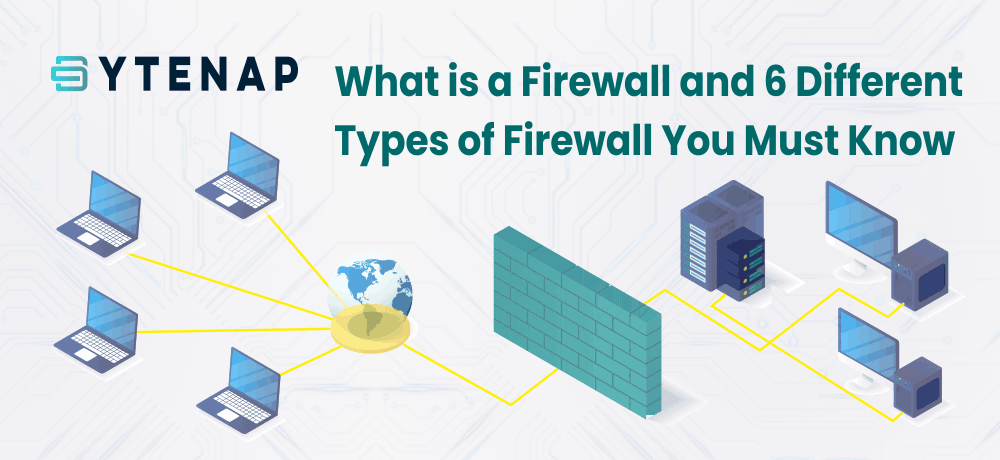In this blog post, we will be discussing what is a firewall, what is its purpose, and will be looking at 6 different types of firewalls you must know.
As the threat against cyber attacks is increasing with each passing day, securing your infrastructure becomes of utmost crucial. There are several ways to secure your infrastructure but a firewall can prove to be a simple, effective, and satisfactory solution for data security. Now, let’s have a look at what is a firewall? and then be discussing 6 different types of firewalls.
What is a Firewall?
A firewall is a device that is utilized to monitor the incoming and outgoing traffic and to identify if it should allow or block the traffic depending on the predefined set of security rules. With a firewall, you can block unauthorized traffic and allow legitimate traffic to be reached at its destination. Moreover, a firewall can block malicious software from infecting your system.
Why Use a Firewall?
A firewall’s objective is to minimize or eradicate unwanted network connections and gradually increase the free flow of legitimate traffic. Firewalls are vital assets for your infrastructure as it can isolate computers and servers from the internet and offer security and privacy of data. Not only do they monitor the web traffic, but they restrict that traffic in some circumstances as well. And having such type of protection in the first place can prove to be beneficial.
For instance, in a Distributed Denial of Service (DDoS) attack, the traffic floods can be a cause of website downtime. However, a properly configured firewall can protect your environment from such situations. You can easily filter traffic and search patterns for irregularities that point to an incoming attack.
Overview of What is Software Firewall and Hardware Firewall
Mainly there are two firewalls (hardware and software firewall) solutions from which you can choose. You can use one of these or both types of firewalls to secure your environment. But, make sure that you use at least one of these methods else you may be vulnerable to cyber threats and malware.
Software Firewall
A software firewall is a firewall that is installed on your local system or computer that allows or blocks incoming and outgoing traffic of your computer based on configured rules and does not require any physical set up.
Hardware Firewall
A hardware firewall is a physical device that is meant to monitor, observe and control the traffic to infrastructure based on appropriate settings and doesn’t hinder the performance of your server as the firewall is separate from your server.
Suggested For Further Reading
Now, let’s see 6 different types of firewalls.
What are 6 Different Types Of Firewalls?
The six types of firewalls are:
Packet Filtering Firewall
In the Packet Filtering firewall, data packets are examined, analyzed, and compared with configuration rules. It then identifies what is denied or allowed access.
Stateful Multilayer Inspection Firewalls (SMLI)
Stateful Multilayer Inspection Firewalls or SMLI firewalls filter the data packets at the network, transport, and application layers. SMLI firewalls analyze and examine the whole data packets and compare them with trusted ones. The data packet is forwarded only if they pass individually. This ensures secure communication, which is taking place with trusted sources.
Stateful Inspection Firewall
The stateful Inspection method enables the analysis of traffic flow patterns as per the state, port, and protocol. The firewall monitors or observes the activity on a connection from open port to close the port and keeps track of known, trusted packets to identify if data from the site or app is authorized or not.
Next-Generation Firewalls (NGFW)
Conventional Firewalls such as the SMLI firewall just inspect the packet headers. However, Next-Generation Firewalls unite the firewall technology with additional functionality to analyze data within the packets to identify and stop malicious data more efficiently.
Proxy Firewall
Proxy-based firewalls take stateful inspection one step ahead by restricting direct network connections among internet traffic and the server. A proxy firewall acts as a middleman among your server and end-user requests. Whole packets are examined and then allowed or blocked based on the set rules.
Network Address Translation Firewalls (NAT)
NAT firewalls are like proxy firewalls, they act as a middleman among a group of computers and outside traffic. NAT firewall behaves like a private network and lets several devices with independent network addresses to connect to the internet with just one IP address. Devices behind the firewall remain masked and unwanted or unsolicited communication is blocked.
Conclusion
We hope through this article, you understand the importance of firewall and now know the 6 different types of firewalls.
Additionally, you can check out our Spam Experts plans that provide comprehensive protection against viruses, spam, and malware with the help of advanced algorithms and spam pattern detection methods.















